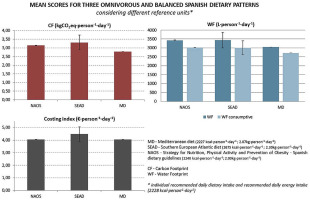Journal of Cleaner Production ( IF 9.7 ) Pub Date : 2020-01-17 , DOI: 10.1016/j.jclepro.2020.120125 Sara González-García 1 , Rosemary F Green 2, 3 , Pauline F Scheelbeek 2, 3 , Francesca Harris 2, 3 , Alan D Dangour 2, 3

|
Global food demand is increasing due to population growth and dietary transitions, resulting from rising incomes, are associated with increased prevalence of non-communicable diseases. Improving the sustainability of the food sector is also critical for achieving the Sustainable Development Goals. This study assesses for the first time the greenhouse gases emissions (Carbon Footprint – CF), the water footprint (WF) and the cost of three omnivorous diets recommended in Spain due to their health benefits: the Mediterranean diet (MD), the Southern European Atlantic diet (SEAD) and the Spanish dietary guidelines (NAOS). Analysis was conducted using standard Life Cycle Assessment and WF methods together with current Spanish food price data.
The dietary energy recommendation of the SEAD is greater than that of MD and NAOS (11 and 15% respectively), and SEAD also has greater animal source food content than the other two diets. SEAD has a concomitantly higher CF, WF and cost scores in comparison with MD (+30%, +23% and +21% respectively) and NAOS (+15%, +9% and +21% respectively). Adjusting recommendations to meet the suggested Spanish adult dietary energy of 2228 kcal∙capita−1∙day−1 changed the environmental profiles of the diets and the NAOS has the highest environmental impact. However, the isocaloric diets had approximately the same cost. Analysis of the WF of the diets identified the major contribution of precipitation (the green WF) to the overall WF (88% of the total) and the significant contribution of animal-source foods to dietary WF. Regardless of the dietary scenario, better scores were identified for the Spanish recommendations analysed than those reported for other healthy diets identified in Europe. Differences in the recommended intake levels of certain food groups, cooking techniques and the origin of food products are behind these results.
Environmental indicators should be considered alongside nutrition and health metrics when defining national dietary guidelines. Supporting citizens to follow healthy and environmentally-friendly dietary recommendations through, among other things, information campaigns and nutritional education programmes is essential.
It is recommended the incorporation not only of health, but also of environmental indicators of these dietary options in the national dietary guidelines, as well as implementation of information campaigns and nutritional education programs among citizens to promote their adhesion since balanced dietary habits rich on plant-based products and low on animal-based ones involve multiple health and environmental benefits.
中文翻译:

西班牙的饮食建议——负担能力和环境可持续性?
由于人口增长和收入增加导致的饮食转变,全球粮食需求不断增加,这与非传染性疾病患病率的增加有关。提高食品行业的可持续性对于实现可持续发展目标也至关重要。这项研究首次评估了西班牙推荐的三种杂食饮食的温室气体排放(碳足迹 - CF)、水足迹(WF)和成本,因为它们有益于健康:地中海饮食(MD)、南欧饮食大西洋饮食(SEAD)和西班牙饮食指南(NAOS)。使用标准生命周期评估和 WF 方法以及当前西班牙食品价格数据进行分析。
SEAD的膳食能量建议高于MD和NAOS(分别为11%和15%),并且SEAD的动物源性食物含量也高于其他两种饮食。与MD(分别+30%、+23%和+21%)和NAOS(分别+15%、+9%和+21%)相比,SEAD同时具有更高的CF、WF和成本分数。调整建议以满足建议的西班牙成人膳食能量 2228 kcal∙capita −1 ∙day −1改变了饮食的环境概况,NAOS 对环境影响最大。然而,等热量饮食的成本大致相同。对日粮 WF 的分析确定了降水(绿色 WF)对总 WF(占总数的 88%)的主要贡献以及动物源性食品对日粮 WF 的显着贡献。无论饮食情况如何,分析的西班牙建议得分均高于欧洲其他健康饮食报告的得分。这些结果的背后是某些食物组的推荐摄入量、烹饪技术和食品来源的差异。
在制定国家膳食指南时,应将环境指标与营养和健康指标一起考虑。通过信息宣传和营养教育计划等方式支持公民遵循健康和环保的饮食建议至关重要。
建议将这些饮食选择的健康指标和环境指标纳入国家膳食指南,并在公民中开展信息宣传活动和营养教育计划,以促进他们的坚持,因为均衡的饮食习惯富含植物性食物。以动物为基础的产品和低动物性产品具有多种健康和环境效益。











































 京公网安备 11010802027423号
京公网安备 11010802027423号